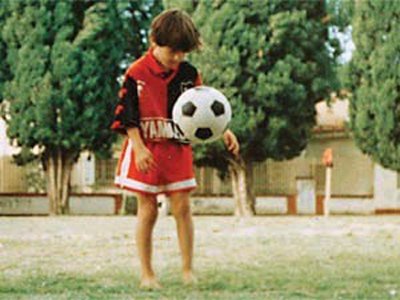Always as a young boy and ever since I can remember I’ve heard repeatedly and from many different people, mostly grown-ups, about how just some kids had the talent and others instead had to develop the skill playing a sport, an instrument, or performing any other task.  Personally I’d prefer if someone said I had talent instead of skill because I thought that if I had talent and at the same time worked as hard a pure-skill-delevoped player, I would still be excel a little more. However one day while having dinner with the team I came up into a debate with one of my teammates claiming how practice was everything and there was no such thing as talent. Evidently, he was the only one in the table with that point of view, everyone else including me knew the concept talent truly existed. However, my friend was so determined and went on saying how he read a book about it particularly, therefore creating that strong held belief for him. He pointed out how everybody firmly believes Messi is incredibly talented and Cristiano Ronaldo is purely skilled, developed by hours and hours of work. Yet he claimed that Messi might have put just as much hours in training as Cristiano, thus making a doubt that Messi might also be only skilled. So it created in me a small doubt that he might be on to something. This claim is definitely intriguing for me so I looked into it. Does the concept of talent exist or are everyone that are called talented became practiced to the point there were as skillful that people might’ve just mistaken it for talent?
Personally I’d prefer if someone said I had talent instead of skill because I thought that if I had talent and at the same time worked as hard a pure-skill-delevoped player, I would still be excel a little more. However one day while having dinner with the team I came up into a debate with one of my teammates claiming how practice was everything and there was no such thing as talent. Evidently, he was the only one in the table with that point of view, everyone else including me knew the concept talent truly existed. However, my friend was so determined and went on saying how he read a book about it particularly, therefore creating that strong held belief for him. He pointed out how everybody firmly believes Messi is incredibly talented and Cristiano Ronaldo is purely skilled, developed by hours and hours of work. Yet he claimed that Messi might have put just as much hours in training as Cristiano, thus making a doubt that Messi might also be only skilled. So it created in me a small doubt that he might be on to something. This claim is definitely intriguing for me so I looked into it. Does the concept of talent exist or are everyone that are called talented became practiced to the point there were as skillful that people might’ve just mistaken it for talent?
Null hypothesis: Practice creates skill, or talent
Alternative hypothesis: Practice only creates skill, not talent
According to the article “What is talent?” published by David Ulrich and Norm Smallwood, talent=competence x commitment x contribution. Competence is referred to as the knowledge, skills and value which are needed for today’s jobs. Commitment is also highly important in this formula because an employee that is competent but not committed will be prepared for the job but wouldn’t work as hard as a committed employee, and companies definitely prefer employees whom will work hard, do what they are asked for, and go out of there way to get better skilled and perform better at their jobs. While contribution means that employees are feeling that the time that they are investing in their work is meaningful not only to them but to the organization or their co-workers as well. Briefly, talent constitutes of skills, wills and purposes, because it turns oneself someone capable, committed and contributing. While this article doesn’t necessarily answer the hypothesis, it support the idea that talent isn’t just something magical or esoteric only few people have or are born with.
The take away message is that talent is something people can work toward for. Purpose is something that keeps individuals thoroughly engaged in activities where one day someone might call them out for having talent. The formula by David ulrich and Norm Smallwood seem to make sense out of how talent is formed. Therefore, the null hypothesis was unable to be rejected.
